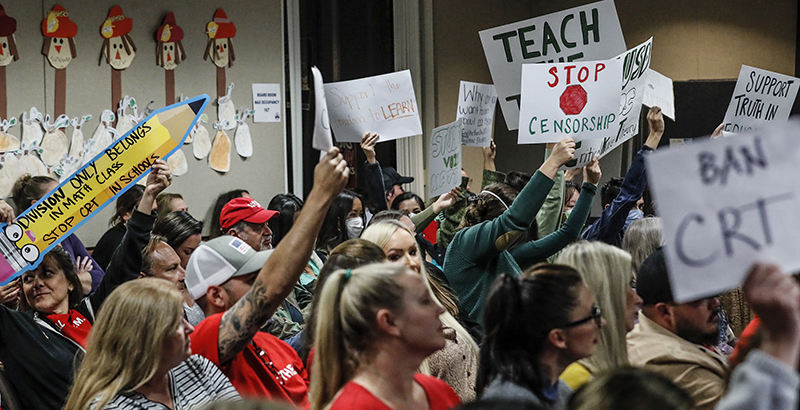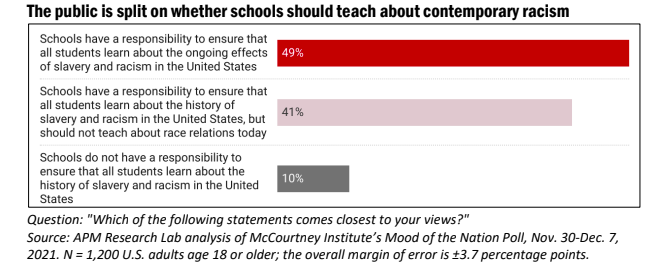New National Poll: Americans Split on Whether Schools Should Teach Current-Day Racism

Get stories like this delivered straight to your inbox. Sign up for The 74 Newsletter
As battles erupt around the country over how the subject of race should be treated in the classroom, a new survey finds Americans are split over whether schools should teach children about current-day racism.
It found that 49 percent of 1,200 respondents from around the country said schools have a responsibility to ensure students learn about the ongoing effects of slavery and racism in America while 41 percent believe schools should teach students about the nation’s history of slavery and racism — but not about race relations today.
A full 10 percent said schools do not have a responsibility to teach anything about slavery or racism in the U.S., according to the sixth annual Mood of the Nation Poll conducted by The McCourtney Institute for Democracy at Penn State.
The results were further broken down by other demographic factors: 79 percent of Black respondents and 77 percent of Democrats and Independents who lean Democratic believe students should, in fact, learn about the ongoing impacts of both slavery and racism.
The teaching of both topics has been under intense fire with 36 states recently moving to prohibit or attempting to dramatically curtail discussion of race and race-related topics in the classroom, often targeting a concept called critical race theory which explains how American racism has impacted a wide range of systems and institutions.
Conservatives across the country have renewed their push for removing some texts — including the the Pulitzer Prize-winning Holocaust graphic novel Maus — that explain racial and ethnic discrimination.

“The public is a little more divided than we thought,” said Craig Helmstetter, managing partner at American Public Media Research Lab, a St. Paul, Minnesota-based group that conducts independent, nonpartisan research and reporting. APM Research Lab reported the poll results and analysis.
The poll, released today, was conducted between Nov. 30 and Dec. 7, 2021. The data was collected online by YouGov and has an overall margin of error of plus or minus 3.7 percentage points.
In addition to questions on race, it also addresses the degree to which people believe parents should influence their child’s education — another current flashpoint — and the teaching of evolution and sex education.
“There are an awful lot of people who think parents ought to have a substantial amount of influence even though they have no statutory or legal role in setting curriculum,” said Eric Plutzer, a political science professor at Penn State and the McCourtney Institutes’s director of polling. “That was especially pronounced among Republicans and social conservatives.”
Another group, he said, believes these decisions should be left up to people with expertise, including teachers, because of their subject matter knowledge and classroom experience, and state agencies, which have long crafted curriculum standards.
“That view was expressed by Democrats and social liberals,” Plutzer said.
The biggest gap between those who thought parents should have the most sway and those who thought teachers should be more influential was on the question of COVID safety, with 46 percent saying parents should have a great deal of influence in that area and 28 percent saying educators should.
The poll considered respondents’ gender, age, race, income and political party, among other factors. It also accounted for religion, including affiliation and frequency of worship attendance.

While 90 percent of respondents said schools should teach scientific evolution, half think it should be combined with the teaching of biblical perspectives about creation. A full 10 percent said schools should teach only biblical perspectives.
More than a quarter of those surveyed said they were born again or Evangelical Christians, and their distinctiveness from those of other faiths shows up in several ways:
Just 12 percent believed schools should teach evolution only as compared to 58 percent of other respondents. A full 66 percent of Democrats and those who lean Democratic held the position as compared to 25 percent of those who were Republican or Republican-leaning.
Helmstetter said policymakers should not discount the role of religion in America.
“Although there is a long, steady decline in the number of people attending church on a regular basis, it is still an important and significant part of people’s lives,” he said. “We should acknowledge and pay attention to it. There are some pretty big divisions across all of these questions, specifically as it relates to people being identified as born again Christians.”
And while 75 percent of respondents believe sexual education for teens should include the dangers of sexually transmitted infections as well as contraception, a majority said they believe parents of school children should have “a great deal of influence” on how sex education is taught. That number includes 72 percent of Republicans, among them Independents who lean Republican, 66 percent of born again Christians and 63 percent of those age 65 or older.
Nearly half of born again Christians think sex education for teens should stop at teaching about STIs and abstinence: 37 percent of Republicans, including independents who lean Republican, held this same view.
Just 22 percent of respondents said local school boards and state departments of education should have significant influence over the teaching of sexual education, an opinion slightly more common among Black Americans and Democrats as compared to other groups.
The survey included a number of open-ended questions that allow respondents to explain their views in their own words: A 63-year-old white woman from Georgia, who does not identify as a born again Christian or Evangelical, said school boards and educators should have a great deal of influence on the teaching of sex education.
“Local teachers have a rapport with students and can build a trust with them,” said the woman, who identified herself as Republican.
Plutzer, considering the division on so many issues, said schools looking to make big decisions without including parents might be considered out of touch.
“There is already eroding respect for expert judgement in many parts of our society including education,” he said, adding a failure to include parents would only make adopting best practices more difficult. “It doesn’t mean the recommendations of those experts is wrong, but it means that if they are resisted, even a good recommendation is not going to be implemented well.”
Get stories like these delivered straight to your inbox. Sign up for The 74 Newsletter

;)
